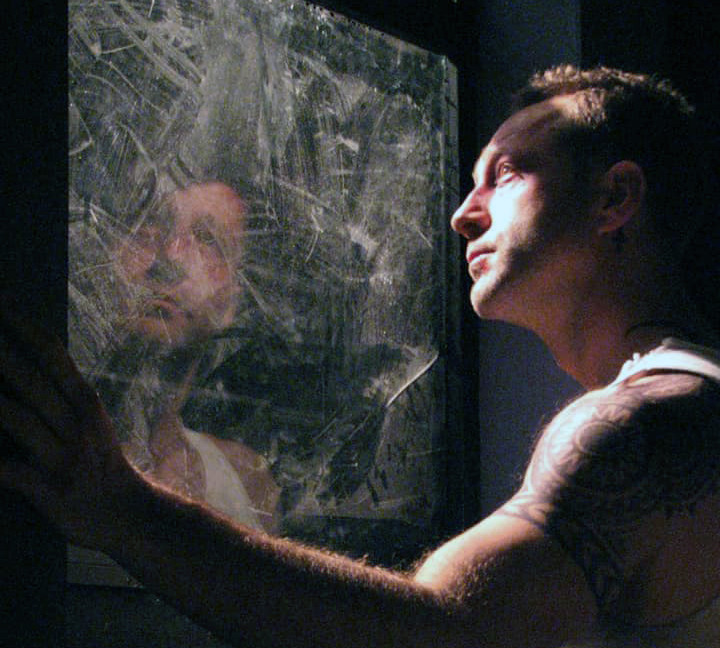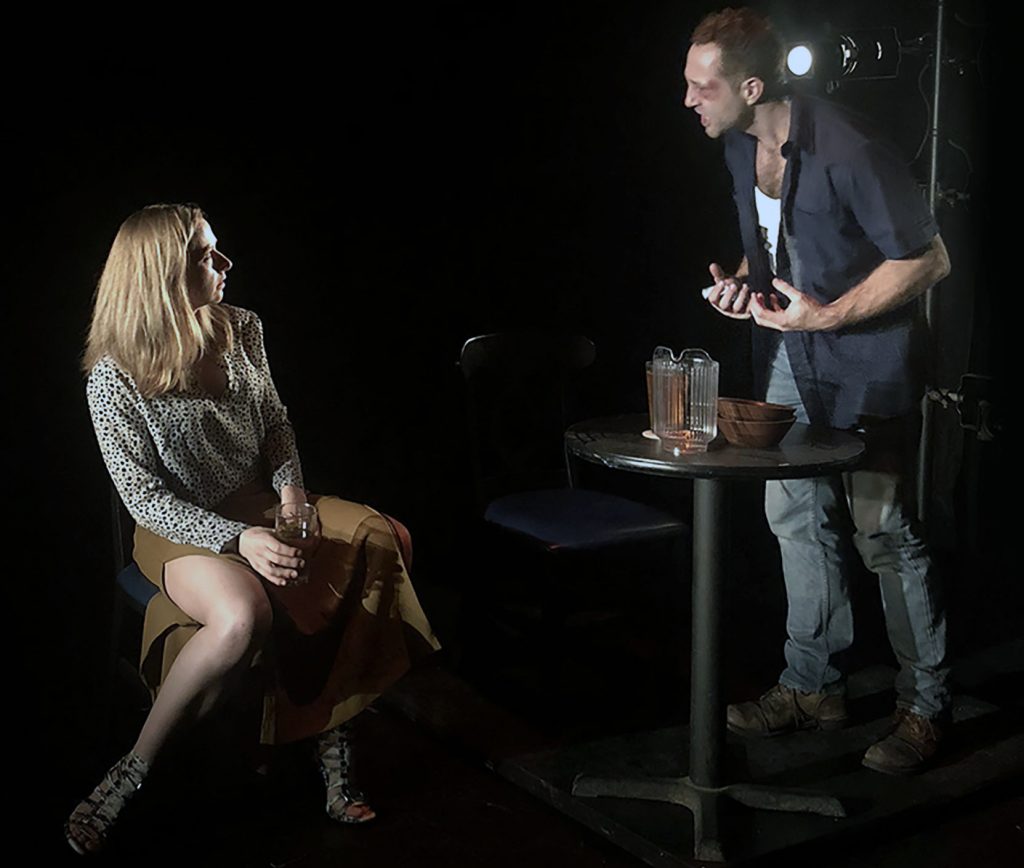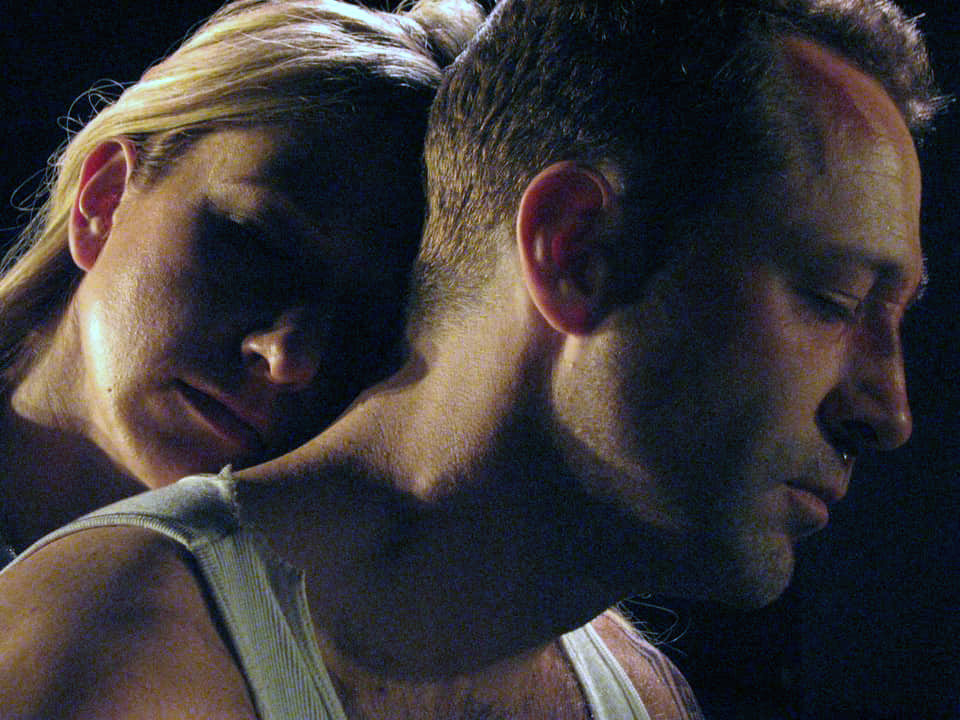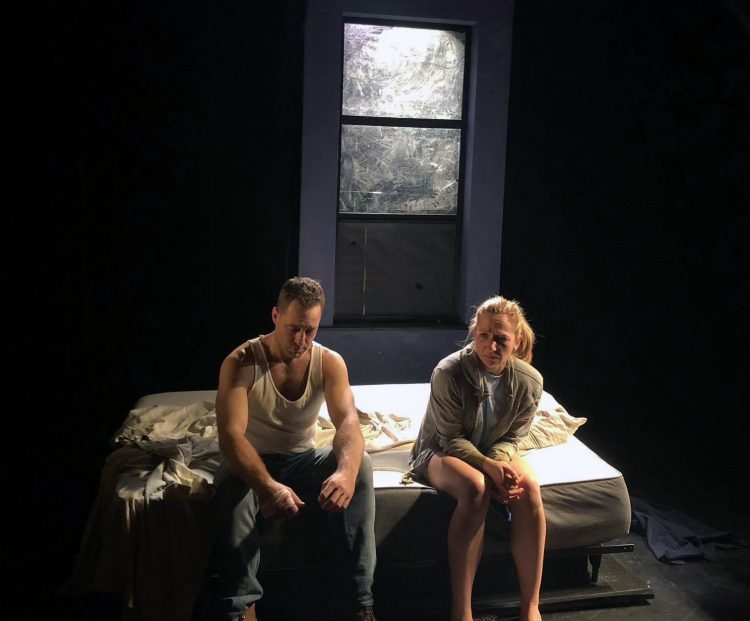“We’re all more than the worst thing we’ve done.”
That’s not a line from “Danny and the Deep Blue Sea.” It’s a quote from public interest lawyer and civil rights activist Bryan Stevenson. But it could serve as a tagline for John DeSotelle’s deeply affecting production of John Patrick Shanley’s modern classic, running at the NuBox Theater through December 22nd.
Danny (Jacob Saxton) may have killed a man yesterday in a fight over ten dollars. When we meet him at a dive bar in the Bronx, he’s a bruised and bloodied sociopath with a chip on his shoulder the size of East Tremont. Across the bare stage on a desert island of her own sits Roberta (Maggie Alexander), to all appearances a drunken barfly looking to score with a local bad boy. Part of what makes this play so potent is how Shanley has these two characters chip away at their first impressions of each other (and our first impressions of them) to reveal two vulnerable, wounded souls starving for love and redemption. It’s a difficult, painful transformation, and one that Saxton and Alexander make believable and real.

The challenge to playing Danny is twofold. On the one hand, we—and Roberta—have to believe Danny is dangerous. If he comes across as a paper tiger, Roberta merely calls his bluff. But everything about Saxton signals a clear and present danger—his build and bearing, gruff voice, tribal tattoos, realistic wounds on face and hands, and above all his cold-blooded intensity. So when Roberta pushes him too far, she does it to punish herself, not to expose him for the wounded lamb he turns out to be. And this makes her surprise at his tenderness all the more real—so real that the tables turn the next morning when she finds him ready to follow her to the altar.
Which brings me to the second challenge to playing Danny: He has to be dangerous and vulnerable. It’s a rare actor who can do both, and Saxton burrows so deeply into his character’s psychosis that he seems genuinely surprised at the gentle words coming out of his own mouth when Roberta asks him to say nice things about her.
That post-coital exchange of primitive poetry is in many ways the turning point of the play. With it, Roberta gets what she thought she wanted from Danny: a pipe dream of happiness to lull her to sleep. In the harsh light of morning she awakes to find that dream a real possibility. And her efforts to reject it out of guilt for committing incest with her father are what make her a complex character, rather than a masochistic dream girl with a Bronx twang.

This last stage of their life-in-death match or “Apache dance” is Alexander’s time to shine. Pinned down by Saxton’s Danny, she shape-shifts rapidly from cruel cynic to guilt-ridden Catholic to abused daughter like Proteus caught in the grip of Odysseus, until at last she reveals her true form: a single mother with a glimmer of hope for a better life. Alexander commits truthfully to each false identity, and like Saxton she seems genuinely surprised to discover who she really is.
Director and acting teacher John DeSotelle could hardly have chosen a better play to showcase the strengths of the Meisner technique. His casting choices are excellent and his direction of the actors exemplary. Set and lighting designer Matt Imhoff makes outstanding use of the limited space, staging the bar scene against a curtain with the tables spaced widely apart and lighting from both sides to emphasize the horizontal axis, then drawing the curtains to create a vertical axis defined by a bed, high window, and artificial moon.

Only in two brief sequences where the staging departs from naturalism did the show feel slightly adrift: the sex scene with just a single formalized pose and the opening tableau with a verse from a pop song that explains the story a little too clearly. The former could be clarified and taken further, and the latter would benefit from layering and diffusion.
This is an outstanding production of a seminal American play, and I highly recommend it. Whether or not you believe in the redemptive power of love, in the power of people to change for the better, whether or not you agree with Stevenson that our worst deeds don’t define us, Shanley’s play and DeSotelle’s production make a strong case for hope in a time of cynicism and despair. And that alone makes this a show worth watching.
“Danny and the Deep Blue Sea” is playing at the Nubox Theater through December 22. For tickets and information visit desotellestudio.com. For more on Bryan Stevenson check out the trailer for HBO doc True Justice.

